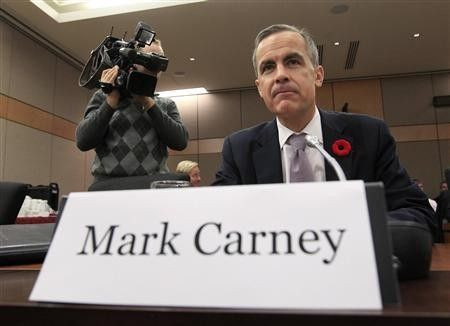Canadian Mark Carney To Become Bank Of England Governor

In a surprising and unprecedented move, the governor of the Bank of Canada, Mark Carney, has been named the new governor of the Bank of England, making him the first non-Briton to ever hold the prestigious post.
Carney, only 47, who will serve for a five-year term when Sir Mervyn King steps down next June, ruled himself out of the job as recently as August.
UK Chancellor of the Exchequer George Osborne, who selected Carney, told parliament that Carney has "strong leadership and external experience the Bank needs.”
Osborne lauded Carney for Canada having “weathered the economic storm better than any other Western economy" during his five-year term as the chief of the Canadian central bank.
"Mark Carney is acknowledged as the outstanding central banker of his generation," Osborne added.
Carney, who will reportedly apply for British citizenship, said he is "honored to accept this important and demanding role" at a "critical time for the British, European and global economies."
Carney has some links to the UK – he studied at Oxford University and his wife is a dual British-Canadian citizen.
BBC reported that Carney will receive a total pay package of about £624,000 (about $1 million) annually. (King makes about £519,000.)
While the BoE governorship in normally an eight-year term, Carney said he wants to step down in January 2018.
Nonetheless, Carney beat out other likely hopefuls for the top spot, including one of the Bank's deputy governors, Paul Tucker; Financial Services Authority Chairman Lord Adair Turner; Sir John Vickers, former chief economist at the Bank and chairman of the Independent Commission on Banking; and Bank of Santander's UK Chairman Lord Burns.
Howard Archer, chief UK & European Economist at IHS Global Insight in London, commented that Tucker was seen as the strongest candidate to succeed King before Carney's emergence.
The appointment of Carney “likely reflects the view that it is a good time to have a complete new broom within the Bank of England following Sir Mervyn King’s dominant position and that this is easier to achieve with a complete outsider,” Archer said.
“Certainly, there has been growing calls for a complete change of culture within the Bank of England, with less deference and the encouragement of the voicing of alternative views. For all Paul Tucker’s strong qualities and experience, there was some concern that he had spent all of his career within the Bank of England, so may find this harder to achieve.”
© Copyright IBTimes 2024. All rights reserved.





















